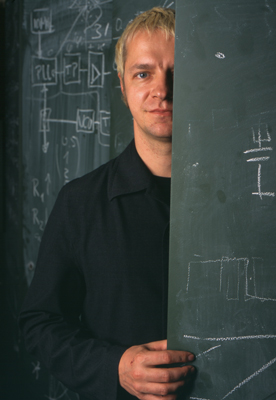Holger Boche, director of the Fraunhofer Institute for Telecommunications, Heinrich-Hertz-Institut HHI, has been awarded the prestigious Euro 2.5 million Leibniz Prize 2008 for his work on the mobile radio networks of the future.
Several key developments in the expansion of the mobile phone networks in recent years have been due to Holger Boche. On the basis of his theoretical work, Boche has advanced the understanding of complex mobile communication systems and at the same time has put his insights into practice in the technology used to standardise new mobile telephone systems. His research is of particular relevance to cross-layer optimisation, which increases the effectiveness and reliability of mobile phone networks. Boche has thus contributed significantly towards making it possible to use the existing mobile network frequencies with as few permanently installed transmitters and receivers to provide full coverage - a task which is not only a considerable scientific challenge but also has great economic potential.

Holger Boche studied information technology at the Technical University Dresden, supplementing his studies with mathematics from 1990 to 1992. Having obtained the respective diplomas, Boche went on to earn doctorates in both subjects, graduating with "summa cum laude". In 2002 at the age of 32 Boche accepted a professorship in mobile communications at the Technical University of Berlin. He has headed the Fraunhofer German-Sino Lab for Mobile Communications since 2003, and took on the joint directorship of the Fraunhofer Heinrich Hertz Institute together with Hans-Joachim Grallert in 2005.
The "Gottfried Wilhelm Leibniz Prize" is awarded by the Deutsche Forschungsgemeinschaft (German Research Foundation) every year since 1985 to scientists working in Germany. The DFG named eleven researchers, eight men and three women, as this year's winners of Germany's most prestigious research prize from amongst 158 candidates. Leibniz prize winners receive a grant of up to 2.5 million, which they can use flexibly according to the requirements of their research projects, over a period of up to seven years. Other winners include: Prof. Dr. Susanne Albers, Theoretical Computer Science, University of Freiburg; Prof. Dr. Martin Beneke, Theoretical Particle Physics, RWTH Aachen University; Dr. Elena Conti, Structural Biology, Max Planck Institute of Biochemistry, Martinsried, with Dr. Elisa Izaurralde, Cell Biology, Max Planck Institute for Developmental Biology, Tübingen; Prof. Dr. Stefan W. Hell, Biophysics, Max Planck Institute for Biophysical Chemistry, Göttingen; Prof. Dr. Klaus Kern, Physical Chemistry of the Materials, Max Planck Institute for Solid State Research, Stuttgart; Prof. Dr. Wolfgang Lück, Algebraic Topology, University of Münster; Prof. Dr. Jochen Mannhart, Experimental Solid State Physics, University of Augsburg.
More information:
http://www.dfg.de/en/news/press_releases/2007/press_release_2007_81.html










